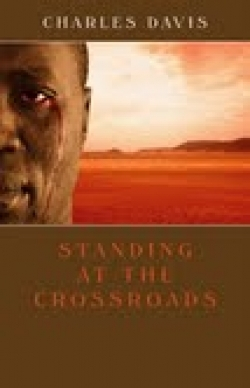Standing at the Crossroads
The villagers call him the Story Man; the whites know him as the Barefoot Librarian. He walks from one village to the next, carrying loads of books and conducting performances based on the stories he reads. Sometimes he imagines he is walking with a literary character: Twain’s “cheerfully unruly” Huck Finn or Dickens’ Miss Havisham, whose walk is “slower than a government paycheck.” An orphanage priest once called him a black devil, but Charles Davis’s narrator in this, his latest novel, only laughs at such talk. Religion, to him, is another useless “ism.” He sees life somewhat the way he sees stories, as messy and chaotic. “Real stories end in doubt,” he suggests.
He is headed through desert and mountains to the “well of books,” a dry, shallow pit that serves as a book warehouse. It is near the crossroads on the way to a large city in what must be Darfur. His companion on this journey is a white woman, Kate, whose purpose is to expose the story, with photographs, of the mass killings in this undeclared war. When the two meet the young mute Mara, something like family happens.
The group is pursued by a band of armed nomads on horseback called the Warriors of God. The Warriors are “very killing people,” if one’s race, gender, and religion do not agree with their own. They fear women and “are practiced in the incisive art of unwomaning a woman’s body.” They also fear books, and are thus out to kill the Librarian. Davis adroitly merges suspense with the insightful reflections of his narrator. When he encounters the stark hostility of the desert, the Story Man is reminded of portrayals of the immense, unforgiving sea in the works of Melville, Conrad, and Golding. And when, in the mountains, he notices that his pursuers seem unwilling to leave their horses and climb on foot, he segues into a meditation on the life-affirming activities of reading and walking versus a useless hankering for permanence, or God. The Story Man is always making meaning from details. “Stories get nearer to the truth than facts,” he observes. But he would add that both are only approximations of truth.
Charles Davis is from England and has lived in Africa and Spain and now France. He has written several Discover Walking Guides, as well as the novels Walk On, Bright Boy and Walking the Dog. His accomplishment here is decidedly literary, a story with straight-arrow commentary that answers war, pursuit, and savagery with love and belonging.
Reviewed by
Joe Taylor
Disclosure: This article is not an endorsement, but a review. The publisher of this book provided free copies of the book to have their book reviewed by a professional reviewer. No fee was paid by the publisher for this review. Foreword Reviews only recommends books that we love. Foreword Magazine, Inc. is disclosing this in accordance with the Federal Trade Commission’s 16 CFR, Part 255.


